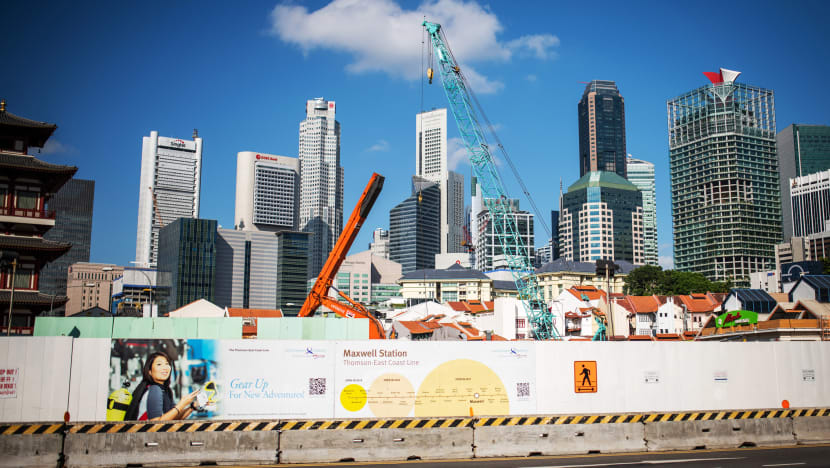Tougher laws to be introduced in October 2022 to reduce construction noise and greenhouse gas emissions

File photo of a construction site in Singapore. (Photo: iStock)
SINGAPORE: Contractors who carry out work at construction sites near residential areas and hospitals on days they are not supposed to may be required to set up cameras at their worksites.
The measure comes as authorities look to toughen enforcement of the no-work rule, which prohibits work at construction sites located within 150 metres of any hospital, home for the aged sick or residential building, on Sundays and public holidays. The National Environment Agency (NEA) may grant permits for quieter forms of work.
Under amendments to the Environmental Protection and Management Act that were passed on Monday (Sep 13), offenders may be made to install, maintain and operate electronic video surveillance systems, including closed-circuit television cameras, at their work sites. All this will be done at the contractor's own cost.
Authorities can specify the type of surveillance system required, the number and location of monitoring devices, as well as the duration in which the surveillance system is to be operational.
To facilitate remote monitoring and enforcement, recordings must be stored for a specified period and authorities must be given access to the recordings.
During the debate, members of parliament Don Wee (PAP-Chua Chu Kang) and Yip Hon Weng (PAP-Yio Chu Kang) raised concerns over the impact of the new measures on the construction industry, which is already facing challenging times.
In response, Minister of State for Sustainability and the Environment Desmond Tan said the requirements would not affect the “vast majority” of construction sites that comply with the no-work rule.
“The requirement will only be imposed on the very small group of construction sites that have breached the no-work rule. This is around 150 out of 5,800 construction sites a year, or 3 per cent of all active sites," he said.
“There are limitations to the current enforcement approach, as violations of the no-work rule can only be confirmed through physical site inspections by NEA officers,” said Mr Tan. “This is resource-intensive, and not always effective, as the breach of the no-work rule could have stopped by the time NEA officers reach the construction site.”
He added that the cost of installing video surveillance comes up to 1 per cent of total construction project cost on average, with one set of CCTV costing about S$5,000. Depending on the size of the project, up to four such CCTV sets may be required, Mr Tan said.
From April 2014 to March this year, NEA disbursed a total of S$8.3 million in grants to incentivise contractors to adopt quieter construction equipment and methods. These include using quieter piling and hacking equipment, and installing noise barriers and enclosures.
REDUCING EMISSIONS
Amendments were also made to the Environmental Protection and Management Act to help reduce greenhouse gas emissions.
From October next year, air-conditioner and refrigerator models that use refrigerants with high global warming potential (GWP) will be phased out.
GWP refers to a measure of the warming effect of a gas relative to the warming effect of an equivalent amount of carbon dioxide, usually over a 100-year period.
NEA will start with prohibiting the supply of household air-conditioners that use refrigerants with GWP of more than 750, and household refrigerators and commercial water-cooled chillers that use refrigerants with GWP of more than 15.
This is because climate-friendly alternatives are already available in Singapore, said NEA.
To minimise HFC emissions from improper handling and raise competencies, the country will regulate companies that carry out works that involve the use or handling of any greenhouse gases, such as the installation, maintenance and decommissioning of refrigeration and air conditioning equipment.
Companies will be required to establish and maintain policies, procedures and processes for the regulated greenhouse gas works, and ensure that they are carried out safely and in the prescribed manner.
Responding to a question from MP Louis Chua (WP-Sengkang) about the abatement potential of the new measures, Mr Tan said that they are expected to reduce hydrofluorocarbons emissions from the regulated equipment by around half by 2030.
He added that the Ministry of Sustainability and the Environment has initiated a review and is consulting key stakeholders on the plans for the Kigali Amendment, which aims to phase down the production and use of hydrofluorocarbons.
Meanwhile, Nominated MP Hoon Hian Teck asked whether it would be better to price, rather than to regulate, emissions from hydrofluorocarbons.
“Compliance costs may differ across industries and even across firms in the same industry. For example, newer firms might more readily take advantage of clean technology not available to older firms when the latter made their investment decisions,” said Prof Hoon.
“It might be preferable under uncertainty to set a tax on greenhouse gas emissions, and then allow firms to choose the extent to which they wish to control the amount of emissions, so it gives firms some buffer time to transit.”
While pricing remains “an option”, Mr Tan said regulations offer a much greater outcome certainty in abating emissions.
“Even if taxation were to be introduced, these considerations mean that regulations may still be needed. We would also have to consider the cost-effectiveness of the taxation regime, given the highly distributed sources of emissions,” Mr Tan added.
“While the tax can be levied upstream on importers, this has to be coupled with a system of downstream rebates for spent refrigerants that are recovered.” he said, adding that this could potentially result in higher administrative costs.
















